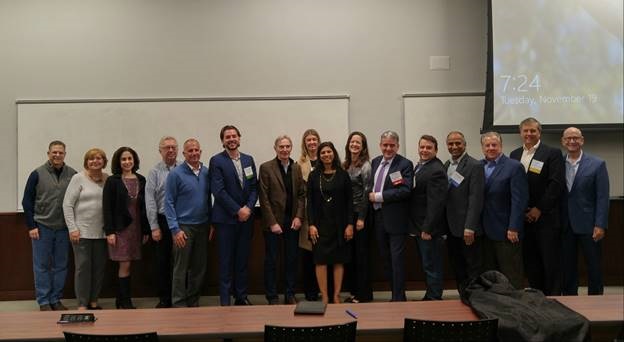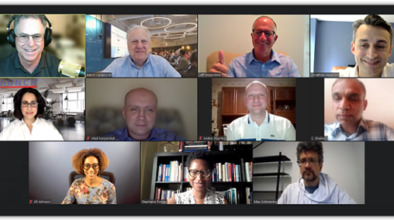eMedEvents Wins November TechLaunch BullPen Panel Vote, Hooke Audio is Audience Favorite
[The next TechLaunch BullPen event will take place on Feb. 12 at Fairleigh Dickinson University in Madison. Register to attend here.]
At the TechLaunch BullPen pitch competition that took place in November at Monmouth University, eMedEvents, a Mendham-based company that provides a single point of access for physicians seeking continuing medical education credits, took home a first-place endorsement from the panel of investors.
Winners of the investor panel award receive over $15,000 of professional services donated by TechLaunch’s sponsors and are invited to pitch at an upcoming meeting of Jumpstart NJ Angel Network.
The audience, on the other hand, was impressed with the pitch by Hooke Audio founder and CEO Anthony Mattana. The Brooklyn-based audio hardware/software company already has a product in the market that significantly enhances how we hear music and podcasts.
The format of these events is that startups pitch, followed by a Q&A session with questions from the audience, and then comments from the panelists. The event always includes a student startup from the hosting university.
eMedEvents (Mendham)
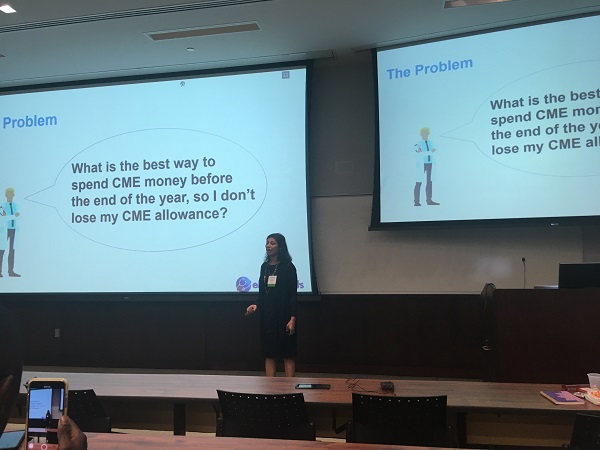
Founder and CEO Priya Korrapati started her pitch for eMedEvents by noting that she has nine physicians in her family who are always looking for courses and other ways to obtain their Continuing Medical Education (CME) credits. It was hard for them to find CME courses and fit them into their busy professional and personal lives. “In several cases, when they started a new job, they didn’t even know how many CME points they had,” she said. Ultimately, it “came down to three questions: How do we get CMEs? Where do we get CMEs? And, when do we get CMES?” It was a chaotic, complex problem.
Korrapati’s solution was eMedEvents, a one-stop shop for CMEs. Physicians can come to the site, discover courses, and register for them. They can search by specialty, subspecialty, title, location, data and organizer. “It’s not only that we will track their CMEs. We have a CME vault to keep all their CME certificates,” she said.
The instruction providers pay eMedEvents to list their CME courses, and by the time Korrapati spoke at the TechLaunch event in November, there were over 120,000 courses on the site, not just in the United States., but globally, with “150 counties using our site.” The company also makes money through a tie-in with Priceline, so that whenever physicians use Priceline to register for courses, eMedEvents gets a 10 percent commission. eMedEvents also makes money through advertising and marketing on the site and also hosts videos, using a Software-as-a-Service model. Korrapati noted that one in three doctors in the U.S. has visited the site.
When an audience member asked how the company would be marketed, Korrapati said that the most effective way would be to go to conferences attended by physicians and service providers for physicians. One of the panel judges, Mark Kolb, entrepreneur in residence at Tech Council Ventures, said that he would have liked to see more discussion of the company’s revenue streams, the profitability of each stream and how the company expected them to grow.
Hooke Audio (Brooklyn)
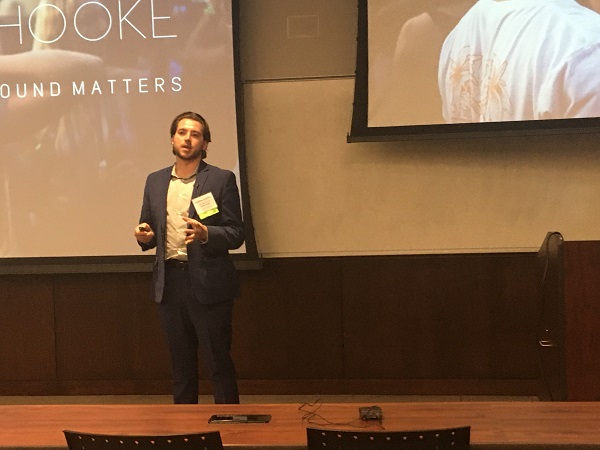
Most people haven’t heard of 3D binaural audio, but Anthony Mattana described it as a technology “that will change the way we recapture and relive amazing sounding moments.”
While the technology has been around for 100 years, Mattana has found a way to adapt it to how we record and listen today — through our smartphones. “A majority of smartphones today capture audio in mono, which is one channel of audio on their phone. It’s the equivalent of us walking around the world with one ear.” We don’t just hear sounds from the left and right, we hear them in 3D: inner sounds from the front, high above and below, he said.
Mattana said that Hooke makes a device that is versatile, portable and immersive, and that fits in a pocket. “We started shipping our first product in 2017,” and in 2019 Hooke opened 10 new retail channels. The company has a patent.
The device records 3D audio through special Bluetooth headphones, which pair with a phone and work “like regular Bluetooth headphones,” he explained. “You can use them to take hands-free calls or listen to music.” But if you want to record something amazing, you open up the Hooke Audio app, and “grab that moment in 3D.”
When the app opens, it overrides the built-in mic on the phone and uses the mics in the earphones, he said. “Then, anywhere in the world, a regular listener can listen to [a recording] though a regular pair of headphones, and experience it as immersive 3D audio.”
Mattana mentioned that he would use the money he is raising to create the second generation of the product. When an audience member asked what changes would be made, Mattana responded that all the changes would be based on feedback from customers. Investor panelist Kimberly Weisul, editor-at-large at Inc. magazine, said the presentation would have been better if Mattana had provided a detailed product roadmap for the judges to evaluate because, though there is a patent on the technology, other manufacturers often can find a way around patents.
TelePlus Health (Summit)
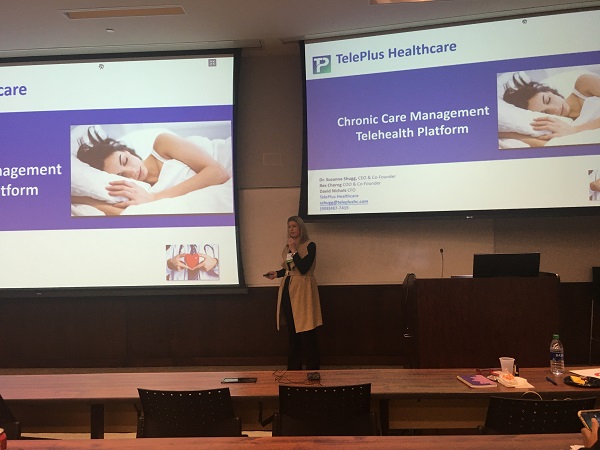
Also presenting was TelePlus Healthcare cofounder and CEO Suzanne Shugg, who was introduced by TechLaunch mentor Robin Bear, a strategy adviser for startups and middle-market enterprises. Bear said that TelePlus has “an interesting platform that actually aligns the interests of payers, providers and patients, which is not an easy thing to do in healthcare.”
TelePlus is a chronic care management company that supervises care through a telehealth platform, Shugg said. It is aimed at the aging population, many of whom have more than one chronic condition. “We call them the ‘silver tsunami’ in healthcare,” Shugg said.
So far, TelePlus has addressed two diseases: congestive heart failure and sleep apnea. Congestive heart disease is being worked on in the U.S. and sleep apnea in Taiwan, where a common facial structure makes it more likely that people will have the disease, Shugg said.
For the congestive heart failure protocol, people who are released from the hospital enroll in the company’s heart failure clinic. They get an initial exam, and at home they have to answer five questions, put on a blood pressure cuff that syncs with the company’s system and get on a scale. “With that information, we have patent-pending algorithms that place them in a risk assessment pool.” The highest-priority patients are classified red, and they get extra attention in order to prevent readmission. The company makes money when cardiologist practices enroll patients into the system, as everything is covered by Medicare, Medicaid and all private insurance plans, she said.
For sleep disorders in Taiwan, the company has partnered with the University of Pennsylvania’s UPENN Sleep Disorder Certificate program, which provides training in sleep disorders to doctors in Taiwan, where there are few specialists in this area. The company’s complete medical management platform supports doctors — from patient entry into the system to data collection, including billing and IT management. TelePlus has partnered with a medical equipment company to offer CPAP machines, and allows patients to come in and choose the most comfortable one for them.
An audience member thought the company was spreading itself too thin, with its two very different models of care. And panelist Allen Fogel, a partner at Robin Hood Ventures (Philadelphia) and managing director at Golden Seeds (New York) investment firms, said that the presentation sped through the financial slides too quickly.
CheckMate (West Long Branch)
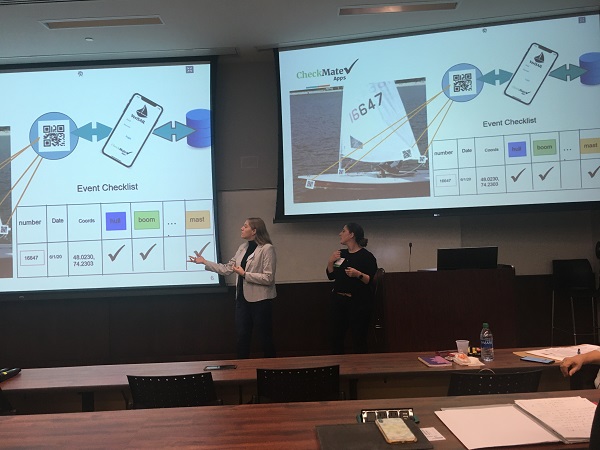
The student startup from Monmouth University was called CheckMate, founded by Patricia Skora and Victoria Johnson, both computer science majors. The startup has streamlined the process of checking the authenticity of all the parts on boats competing in International Laser Class Association racing events.
“This is a particular problem facing inspectors at racing events,” the duo said. “The paperwork leaves a lot of room for human error. Also, after [the inspectors] fill out the form, the record gets thrown in the trash. There is no historical record of inspections done at these sailing events.”
The women came up with a working prototype that automates the process. In order for it to work, manufacturers will have to use QR [Quick Response] Codes on their parts, so that they can be scanned quickly. The racing authority would distribute the QR Codes to the manufacturers.
An audience member suggested that, once the presenters have mastered this niche area, they should look for a “mirror” niche to exploit. One of the judges said that the cofounders should have told a story that illustrated why their automated process is so important.

